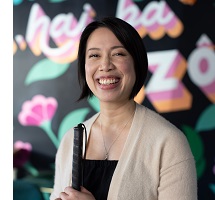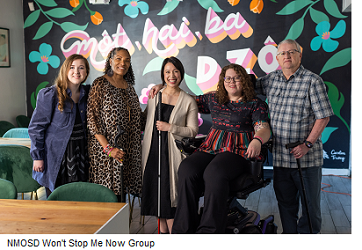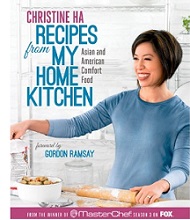
 Christine
Ha shot to fame in 2012 when she became the first blind winner
of MasterChef
with Gordon
Ramsay. Since then, the 44-year-old has made it her mission to
advocate for women, Asian Americans, and the visually impaired.
Whether it’s through TED
Talks or her recent “NMOSD
Won’t Stop Me” campaign, Ha says she’s using her elevated
platform to empower the disadvantaged and to give them hope. Ha was
a 19-year-old student at the University of Texas at Austin when she
first experienced blurred vision in her right eye. It took doctors
four years to properly diagnose her with neuromyelitis
optica spectrum disorder (NMOSD), a rare inflammatory
autoimmune disease of the central nervous system that can lead to
blindness and paralysis.
Christine
Ha shot to fame in 2012 when she became the first blind winner
of MasterChef
with Gordon
Ramsay. Since then, the 44-year-old has made it her mission to
advocate for women, Asian Americans, and the visually impaired.
Whether it’s through TED
Talks or her recent “NMOSD
Won’t Stop Me” campaign, Ha says she’s using her elevated
platform to empower the disadvantaged and to give them hope. Ha was
a 19-year-old student at the University of Texas at Austin when she
first experienced blurred vision in her right eye. It took doctors
four years to properly diagnose her with neuromyelitis
optica spectrum disorder (NMOSD), a rare inflammatory
autoimmune disease of the central nervous system that can lead to
blindness and paralysis.
It was the second time that disaster struck for Ha; at 14, she lost
her mother to lung cancer. But somehow Ha persevered. “I had to
figure out a way to live my best life, the way I saw it, regardless
of whatever hand I was dealt with,” she says. While coping with her
vision loss, Ha sought to reconnect with her mother by recreating
her favorite Vietnamese dishes using trial and error, her father’s
help, and assistive technology. Ha’s blog, the
Blind Cook, caught the attention of MasterChef producers--and
the rest is history.
We spoke to Ha, who describes her vision as “looking at a very foggy
mirror after a hot shower,” about inner strength, the importance of
self-advocacy, and why she values Asian culture.
How did winning Master Chef change your life?
I’m naturally an introvert and pretty reserved around people, and
suddenly my life was in public view. That took a long time to adjust
to, but it opened up a lot of opportunities like being able to do
more cooking on television, to write a cookbook, and eventually open
restaurants. The biggest thing is having my voice be a beacon of
hope for a lot of people, whether it be women, people of color,
Asians all over the world, or people with vision impairment and
other disabilities. Giving them hope is the biggest reward of all.
It must have been terrifying when
you were diagnosed with NMOSD at such a young age.
It was pretty scary. My first symptom was optic neuritis, or
inflammation of the optic nerve, and I was in college. At that age,
you don't think about dealing with a serious illness. I went through
bouts of numbness and tingling in my legs, as well. I was initially
misdiagnosed with MS (multiple
sclerosis), and it wasn't until some years later that I was
finally correctly diagnosed.
Did you lose precious time from your misdiagnosis?
I was put on MS therapies, which weren’t working because I had an
incorrect diagnosis. So I was still getting a lot of flare ups and
attacks, and it was taking a toll on my vision. I gradually lost my
vision because my optic nerves just atrophied after so many bouts of
inflammation. It was actually a relief to find out I had NMOSD
because I finally felt like “OK, I think this is correct.”
Do you think you’d still have your vision if you were properly
diagnosed?
If I was correctly diagnosed, and I was put on the right treatment,
and if my doctors would have listened to me when I said, “I feel
another bout of optic neuritis coming, and I need the steroids right
away; I feel like a combination of these things could have prevented
me from losing as much vision as I have.”
Did doctors dismiss some of your concerns because you were so
young at the time?
I’ve had doctors talk down to me and made me feel like my symptoms
weren't validated. I was asked if it was because I’m a woman and a
woman of color. I didn't think it was really a racial thing, but I
definitely think it was an age thing. Because I was so young, I was
probably dismissed for not knowing enough or being too inexperienced
to know my body. Part of it was also perhaps being a woman.
So your message is to stay informed and speak up?
I've learned that it’s really important to be an educated patient,
and it's important to find a support network, whether it's other
patients that have the same disease or a healthcare team that
understands and listens to you--and makes you feel like your
feelings and your thoughts are valid. I felt very passive in my
treatment plan, and I didn't realize how disempowering that felt
until I finally found doctors and nurses who participated more fully
and allowed me to participate more fully in my health care plan.
Is that why you’re such an advocate for NMOSD awareness?
 It’s exactly why I like to speak up about this--not
only to raise awareness about NMOSD, but about rare diseases in
general. My experience was so isolating, scary, and frustrating that
I want to prevent another person from going through that same
experience. I want to raise awareness because NMOSD primarily
affects the Asian and African American population, so I'm trying to
help others who were initially misdiagnosed with another disease
like MS. Even broader, I’d like to help minimize the loneliness by
connecting patients with other patients and caregivers with other
caregivers, and giving them the right resources so that they can
make educated decisions about their health care teams and the right
treatment plans. That’s why I partnered with Horizon
on this NMOSD
Won't Stop Me campaign.
It’s exactly why I like to speak up about this--not
only to raise awareness about NMOSD, but about rare diseases in
general. My experience was so isolating, scary, and frustrating that
I want to prevent another person from going through that same
experience. I want to raise awareness because NMOSD primarily
affects the Asian and African American population, so I'm trying to
help others who were initially misdiagnosed with another disease
like MS. Even broader, I’d like to help minimize the loneliness by
connecting patients with other patients and caregivers with other
caregivers, and giving them the right resources so that they can
make educated decisions about their health care teams and the right
treatment plans. That’s why I partnered with Horizon
on this NMOSD
Won't Stop Me campaign.
How did you find the inner strength to handle going blind?
I survived it by taking it day by day, even sometimes hour by hour,
or minute by minute. It was a lot of mental strength and
determination. All of us are a lot more resilient than we think we
are. We don't really know how we’ll survive until we're put to that
test. My mom wasn't around, and I love my dad, but he was a very
typical Asian dad, so I couldn't really talk to him. I have great
friends, but none of them were going through what I was going
through. It’s important to acknowledge that I was down and
depressed. As I got older and had more life experience, I realized
that everything is temporal and time will pass at some point. I was
able to get through it by knowing that eventually there was an
endpoint.
Do you think your resilience comes from hearing your parents
talk about their hardships in Vietnam and how they escaped the
Vietcong?
I do attribute a lot of my personality and perseverance to my
parents. I was taught that life is never easy, and you have to fight
for what you want. It would have been better if my parents sat with
me and let me be in that pain and feel the grief. But a lot of how
they parented was how they were brought up. I didn't understand
their experience because I didn't come here on a ship, and I wasn't
a refugee. Until you’re older, it's hard to empathize and understand
the sacrifices they made.
How did your parents escape Saigon during the last days of the
Vietnam War?
They were courting and had just graduated university, and it was a
few days before the fall of Saigon, so it was late April 1975. My
dad ran to my mom's house to ask her to escape to Vietnam, so
basically he was asking for permission to marry her. So they ran to
the US naval ship at the port and fought their way onto the ship.
They escaped before the official fall of Saigon and were at sea for
a while. Their ship broke down and they eventually made their way to
the Philippines and flew to Guam, where they were in a refugee
camp before they were sponsored by a church in Pennsylvania.
They ended up moving to Pennsylvania, then Chicago, and then to LA
where I was born.
Did you start cooking because you missed your mom’s Vietnamese
dishes?
I missed my mom's food because she never taught me how to cook. But,
when I was in college, I had to figure out a way to feed myself.
After several attempts at cooking, I realized that I enjoyed it.
There was something very zen about chopping things up and cooking
them and then being able to feed my friends and my roommates, too.
That’s what sparked my first love for cooking.
Did you have any formal training as a chef?
No, I’m 100 percent self-taught.
You wrote a cookbook, hosted MasterChef Vietnam, and opened a
few restaurants. What else is going on?
 The cookbook was part of winning [MasterChef], so I
wrote it right after and published it the year after. I also did
guest appearances on MasterChef Vietnam and was a full-fledged judge
on season three. I did a lot of guest judging on MasterChef U.S. I
did a cooking show, Four
Senses, in Canada that was geared toward the visually impaired
cook. I did a lot of events and public speaking about what it's like
to be an Asian woman in this industry as someone with a disability.
I’ve also worked with the US Embassy doing culinary diplomacy tours
overseas. Then in 2019, I opened my first restaurant, The
Blind Goat, in Houston.
The cookbook was part of winning [MasterChef], so I
wrote it right after and published it the year after. I also did
guest appearances on MasterChef Vietnam and was a full-fledged judge
on season three. I did a lot of guest judging on MasterChef U.S. I
did a cooking show, Four
Senses, in Canada that was geared toward the visually impaired
cook. I did a lot of events and public speaking about what it's like
to be an Asian woman in this industry as someone with a disability.
I’ve also worked with the US Embassy doing culinary diplomacy tours
overseas. Then in 2019, I opened my first restaurant, The
Blind Goat, in Houston.
Tell us about the Blind Goat and Xin
Chao.
I named my first restaurant the Blind Goat because I’m known as the
blind chef and the goat is my Vietnamese astrological sign. I wanted
to give it a fun name because it's a whimsical modern Vietnamese
restaurant that showcases Vietnamese street food and seafood.
Xin Chao means ‘hello” in Vietnamese. I partnered with Chef
Tony Nguyen. We grew up eating a lot of traditional Vietnamese
food, along with barbecue, Tex Mex, and Gulf Coast cajun food. So I
describe Xin Chao as a contemporary Vietnamese space with
traditional Vietnamese dishes, but with a Texas Gulf Coast twist on
it.
And you just opened Stuffed
Belly.
In June, I opened my third restaurant, called Stuffed Belly, and
this one is a drive thru casual craft sandwich joint with Asian
elements throughout some of the sandwiches. It’s mainly classic
American childhood sandwiches with my fun twist on them.
You have a BA in finance. Why did you switch gears and get an MA
in creative writing?
I was going to take the business route but it was during my
corporate job that I started experiencing all of these NMOSD
symptoms. I had to leave work for a long time because of the attacks
that left me paralyzed from the neck down for a while. I left the
corporate world and started thinking, “What do I really want to do?”
I've always loved to read and rediscovered my love for literature,
so I decided to go back to school and learn the craft of creative
writing.
Is a novel on the horizon?
I've been working on my memoir and I tabled it because of all this
restaurant stuff. But I hope to finish it once these restaurants can
stand on their own.
Do you feel close to your Vietnamese roots?
I identify more as American than Vietnamese because I was born and
raised in America. I think we're taught to be independent thinkers.
And while that's great, I also hold the value of a lot of Asian
thought, where you think about the communal good. But it’s a
balance. It’s important to get along with others and to think
everyone's needs are as important as our own. At the same time, I
value independence and being vocal. I always try to encourage young
Asian girls to find their voice and not be afraid to speak their
minds.
You have three strikes against you--you’re a woman, you're
Asian, and you have a disability. What advice do you have for
those at a disadvantage?
It’s not easy. I have to be two to three times as vocal to be heard.
I grew up as an Asian daughter, so I was always taught to kind of
suck it up; be quiet, be obedient, and just say yes. My mom believed
in some very traditional gender roles, but she was a feminist based
on the things she taught me, like, “Be a strong person and say what
you think.” A lot of my personality comes from her. I understand now
as a business owner that sometimes you have to address things or
it'll just fester. My advice is to be kind and compassionate towards
other people, but don't be afraid to use your voice.